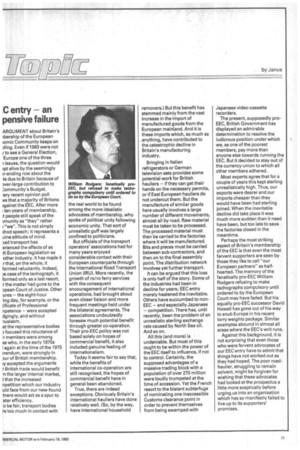C entry — an pensive failure
Page 73

If you've noticed an error in this article please click here to report it so we can fix it.
ARGUMENT about Britain's ibership of the European lomic Community keeps on aling. Even if 1983 were not to see a General Election, Europe one of the three 1 issues, the question would )pt alive by the seemingly rr-ending row about the te due to Britain because of aver-large contribution to ;ommunity's Budget.
,ery recent opinion poll vs that a majority of Britons )gainst the EEC. After more Iten years of membership, t people still speak of the imunity as "they" rather "we". This is not simply ;hod speech; it represents a uine attitude of mind.
aad transport has
3rienced the effects of as ;h European legislation as other industry. It has made it r that, on the whole, it formed reluctantly. Indeed, re case of the tachograph, it formed only as a last resort, r the matter had gone to the apean Court of Justice. Other ures -the eight-hour ing day, for example, or the tificate of Professional npetence were accepted dgingly, and without iusiasm.
et the representative bodies focused this reluctance of 1r members were among se who, in the early 1970s I again at the time of the 1975 rrendum, were strongly in aur of British membership. ly accepted the arguments t British trade would benefit -n the larger internal market, I that the increased
npetition which our industry uld face from our new-found tners would act as a spur to ater efficiency.
.o be fair, transport bodies re too much in contact with the real world to be found among the more idealistic advocates of membership, who spoke of political unity following economic unity. That sort of unrealistic guff was largely confined to politicians.
But officials of the transport operators' associations had for many years enjoyed considerable contact with their European counterparts through the International Road Transport Union (IRU). More recently, the growth of ro/ro ferry services with the consequent encouragement of international operations, had brought about even closer liaison and more frequent meetings held under the bilateral agreements. The associations undoubtedly foresaw much potential benefit through greater co-operation. Their pro-EEC policy was not based solely on hopes of commercial benefit, it also included genuine feeling of internationalism.
Today it seems fair to say that, while the benefits of international co-operation are still recognised, the hopes of commercial benefit have in general been abandoned.
True, there are indeed exceptions. Obviously Britain's international hauliers have done relatively well. (So, by the way, have international household removers.) But this benefit has stemmed mainly from the vast increase in the import of manufactured goods from the European mainland. And it is these imports which, as much as anything, have contributed to the catastrophic decline in Britain's manufacturing industry.
Bringing in Italian refrigerators or German television sets provides some potential work for British hauliers if they can get their hands on the necessary permits, or if East European hauliers do not undercut them. But the manufacture of similar goods here usually involves a large number of different movements, almost all by road. Raw material must be taken to be processed. The processed material must then be carried to the factories where it will be manufactured. Bits and pieces must be carried between sub-contractors, and then on to the final assembly point. The distribution network involves yet further transport.
It can be argued that this loss is only half of the story. Some of the industries had been in decline for years; EEC entry merely hastened the inevitable. Others have succumbed to nonEEC and especially Japanese competition. There has, until recently, been the problem of an unrealistic sterling exchange rate caused by North Sea oil. And so on.
All this (and more) is undeniable. But most of this ought to be within the power of the EEC itself to influence, if not to control. Certainly, the supposed advantages of a massive trading block with a population of over 270 million were loudly trumpeted at the time of accession. Yet the French resort to the blatant subterfuge of nominating one inaccessible Customs clearance point in order to prevent themselves from being swamped with Japanese video-cassette recorders.
The present, supposedly proEEC, British Government has displayed an admirable determination to resolve the ludicrous position under which we, as one of the poorest members, pay more than anyone else towards running the EEC. But it decided to stay out of the currency union to which all other members adhered.
Most experts agree that for a couple of years this kept sterling unrealistically high. Thus, our exports were dearer and our imports cheaper than they would have been had sterling joined. When the inevitable decline did take place it was much more sudden than it need have been, but too late to save the factories closed in the meantime.
Perhaps the most striking aspect of Britain's membership of the EEC is that even the most fervent supporters are seen by those they like to call "our European partners" as halfhearted. The memory of the fanatically pro-EEC William Rodgers refusing to make tachographs compulsory until ordered to by the European Court may have faded. But his equally pro-EEC successor David Howell has gone out of his way to snub Europe in his recent lorry weights package. Similar examples abound in almost all areas where the EEC's writ runs.
Against this background, it is not surprising that even those who were fervent advocates of our EEC entry have to admit that things have not worked out as they had hoped. The poor roadhaulier, struggling to remain solvent, might be forgiven for wishing that these advocates had looked at the prospectus a little more sceptically before urging us into an organisation which has so manifestly failed to live up to its supporters' promises.








































































































